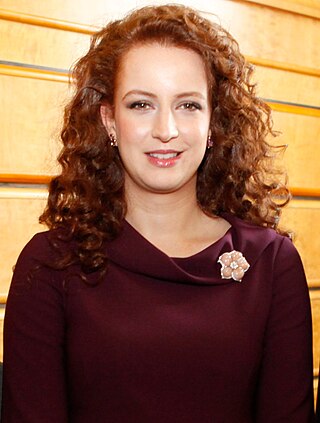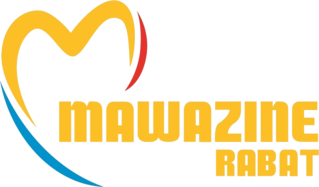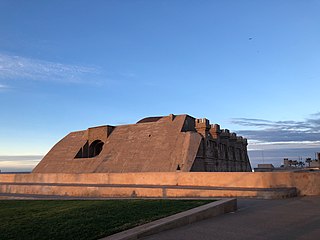
Rabat is the capital city of Morocco and the country's seventh-largest city with an urban population of approximately 580,000 (2014) and a metropolitan population of over 1.2 million. It is also the capital city of the Rabat-Salé-Kénitra administrative region. Rabat is located on the Atlantic Ocean at the mouth of the river Bou Regreg, opposite Salé, the city's main commuter town.
Moroccan music varies greatly between geographic regions and social groups. It is influenced by musical styles including Arab, Berber, Andalusi, Mediterranean, Saharan, West African, and others.

Hassan II was King of Morocco from 1961 until his death in 1999.

Lalla Salma is the former wife of Mohammed VI of Morocco. They married in 2002, and she became the first wife of a Moroccan ruler to have been publicly acknowledged and given a royal title. She was last seen in an official capacity in December 2017, and it was later on reported, in 2018, that she and Mohammed VI had divorced.

Le Printemps de Bourges is an annual music festival that is held in Bourges, France, over the course of five days. It is now a major event in France and Europe.

The culture of Morocco is a blend of Arab, Amazighs, Andalusian cultures, with African, Hebraic and Mediterranean influences. It represents and is shaped by a convergence of influences throughout history. This sphere may include, among others, the fields of personal or collective behaviors, language, customs, knowledge, beliefs, arts, legislation, gastronomy, music, poetry, architecture, etc. While Morocco started to be stably predominantly Sunni Muslim starting from 9th–10th century AD, in the Almoravids empire period, a very significant Andalusian culture was imported and contributed to the shaping of Moroccan culture. Another major influx of Andalusian culture was brought by Andalusians with them following their expulsion from Al-andalus to North Africa after the Reconquista. In antiquity, starting from the second century A.D and up to the seventh, a rural Donatist Christianity was present, along an urban still-in-the-making Roman Catholicism. All of the cultural super strata tend to rely on a multi-millennial aboriginal Berber substratum still strongly present and dating back to prehistoric times.
Abdelkebir Khatibi was a prolific Moroccan literary critic, novelist, philosopher, playwright, poet, and sociologist. Affected in his late twenties by the rebellious spirit of 1960s counterculture, he challenged in his writings the social and political norms upon which the countries of the Maghreb region were constructed. His collection of essays Maghreb pluriel is one of his most notable works.
Moroccan rap music is a Moroccan musical style related to rap and hip hop culture.

Mawazine is a Moroccan International music festival held annually in Rabat, Morocco, featuring many international and local music artists. The festival is presided over by Mounir Majidi, the personal secretary of the Moroccan King Mohammed VI and founder and president of Maroc Culture, the cultural foundation that organizes Mawazine and other events.
Bouchta El Hayani is a Moroccan artist who started his professional career in the 1970s. Since this period he has followed a successful path to become one of the leading and most famous Moroccan artists. First and foremost he is one of the rare Moroccan painters that perfectly master drawing techniques.

Aziz Akhannouch is a Moroccan politician, businessman, and billionaire who is currently the Prime Minister of Morocco since his government took office on 7 October 2021. He is the CEO of Akwa Group and also served as Minister of Agriculture from 2007 to 2021.

Mounir Majidi is a Moroccan businessman. He has been the personal secretary of King Mohammed VI since 2000 and president of the royal holding, SIGER, since 2002. He is also the president of Maroc Culture, the organization behind the Mawazine festival, of the Fath Union Sport (FUS) Rabat, of the Mohammed VI soccer academy, and of the Cheikh Zaid hospital's foundation.

The National Library of the Kingdom of Morocco is located in Rabat, Morocco, with a branch in Tetouan. The former Bibliothèque Générale was created in 1924. In 2003, it was renamed the "Bibliothèque nationale du Royaume du Maroc."

Miriem Bensalah-Chaqroun is a Moroccan businesswoman. She is CEO and vice-chair of Oulmes Mineral Water of Groupe Holmarcom. She is the president of Confédération générale des entreprises du Maroc from 2012 to 2018. She received the Wissam Al-Moukafa Al-Watania in 2013, the Order of Civil Merit in 2017 and the Legion of Honour in 2020.
Mata is an equestrian game and performance performed by the Beni Arous tribe typically in May or June in the village of Znied, in the municipality of Larbaa Aicha, in the province of Larache, Morocco. The competition takes place in the hills upon the tomb of the Sufi saint Moulay Abdeslam ben Machich with over 200 participants. Over the course of three days, tribal teams on horses ride bareback and vie for control of a female puppet, which symbolizes the fertility of the spring season, and take it across the finish line. Women typically fashion the puppet out of tissue and traditional fabrics, making it smell of roses and drawing a face on the doll. Historically, the rider who brought the puppet across the finish line was given the hand of the most beautiful woman of the tribe. Today, the prize is money and prestige. The equestrian display is thought to represent the relationship between man and nature and man and horse. For male riders, it is a representation of their warrior prowess, but there is a single woman who participates in the practice. The practice is rumored to be a variation of the Afghan buzkashi game that the Moulay Abdeslam saw in Asia and brought to Morocco where it was integrated with local customs.

The National Photography Museum is a Moroccan art museum dedicated to photography located in Rabat, Morocco, within the repurposed 19th-century Burj Kebir Fortress in the Ocean neighborhood. This museum was initiated by the National Museums Foundation of Morocco (FNM) and inaugurated on January 14, 2020.
The International Women's Film Festival of Salé or FIFFS, is a film festival held in Salé, Morocco.

Montasser Lahtimi is a Moroccan professional footballer who plays as a winger for Wydad AC on loan from Süper Lig club Trabzonspor.

Brahim El Mazned is a Moroccan cultural manager and director of World Music festivals, who works to develop popular musical activities around the world, with a focus on Moroccan and African culture. He is the founding director of cultural management organization Anya that promotes Moroccan and African cultural activities. Promoting Amazigh culture, El Mazned has served as the artistic director of the Timitar Festival of World Music in Agadir, Morocco. Further, he is the founding director of Visa for Music, the first festival and professional market for music in Africa and the Middle East.
Alain Weber is a French artistic director, musical advisor, producer and stage director. He is the artistic director of several festivals including, Sacred Spirit Festival of Jodhpur and Nagaur, the Fez World Sacred Music Festival, Les Orientales d’Anjou Festival in Saint-Florent le Vieil and Angers and the Al Kamandjati Festival. He is also the artistic director of Zaman Productions, which he set up in 2001 to promote artists and projects. Alain Weber is currently the world music advisor to the Philharmonie de Paris.













